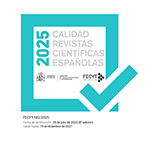A Perspective from Everyday Life on Mursi Material Culture (SW Ethiopia)
Abstract
The Mursi are an agro-pastoralist group from south-west Ethiopia that builds temporary settlements called ôrri a bio. In these settlements, a series of objects that are made from local, abundant materials by using techniques known by most of the population, are used daily. Usually, studies on collective identities pay less attention to this type of everyday objects and prioritize others of a more extraordinary type. However, this set of materials, as well as their forms, functions, meanings and the practices associated with them, play a relevant role in establishing who and how belongs to the community. In the present study we use the ôrri a bio as an ethnoarchaeological unit of observation where we explore the relationship between diverse materialities and the construction of a particular us.Downloads
Article download
License
In order to support the global exchange of knowledge, the journal Complutum is allowing unrestricted access to its content as from its publication in this electronic edition, and as such it is an open-access journal. The originals published in this journal are the property of the Complutense University of Madrid and any reproduction thereof in full or in part must cite the source. All content is distributed under a Creative Commons Attribution 4.0 use and distribution licence (CC BY 4.0). This circumstance must be expressly stated in these terms where necessary. You can view the summary and the complete legal text of the licence.










